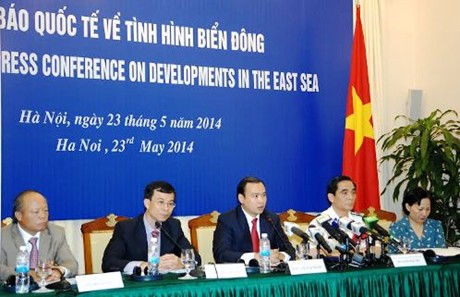No country supports China’s acts of infringement
 |
| The press conference on developments in the East Sea, Ha Noi, May 23, 2014 - Photo: VGP |
>> Vietnam to resolutely defend sovereignty: Prime Minister
>> PM calls on int’l community to voice support for VN
>> NA discusses East Sea issues
Meanwhile, Viet Nam has sufficient legal and historical evidence to prove its sovereignty over Hoang Sa and Truong Sa archipelagos, affirmed Mr. Tran Duy Hai, Vice Chairman of the Viet Nam National Boundary Commission at the press conference on developments in the East Sea on May 23.
Many historical and legal documents as well as maps have been found in Viet Nam and many other countries all over the world, proving that Vietnamese Feudal State has exercised its sovereignty over the two archipelagos.
Mr. Hai said that Viet Nam’s sovereignty over Hoang Sa (Paracel) and Truong Sa (Spratly) was also recognized at the San Francisco Conference in September 1951, which was to settle the issues of territories after the second World War with the participation of 51 states.
At this conference, Head of the Vietnamese delegation, Prime Minister of Bao Dai’s Government Tran Van Huu reaffirmed Viet Nam’s sovereignty over Hoang Sa and Truong Sa archipelagos without any objections from 50 other states.
After signing the Genève Treaty, the French Government transferred the two islands to Sai Gon Administration which had maintained effective control and exercised sovereignty over the two archipelagos.
Since Viet Nam regained unification in 1975, the Socialist Republic of Viet Nam administered the islands in Truong Sa archipelago and constantly asserted its sovereignty over the Hoang Sa archipelago.
Under the contemporary international law on territorial acquisition, a state is recognized to have sovereignty over some territory if that state can prove its occupation of and exercising sovereignty over such territory in the capacity as a state in an effective, continuous and peaceful manner. Accordingly, Viet Nam has established and exercised its sovereignty over Hoang Sa and Truong Sa archipelagos in accordance with principles of international law.
By the use of force, China occupied the Hoang Sa archipelago in 1956 and 1974. Some islets, rocks and shoals in the Truong Sa archipelago of Viet Nam were also occupied by China in 1988.Any acts of using force to occupy Hoang Sa and Truong Sa archipelagos constituted a serious violation of the UN Charter and principles of international law.
A diplomatic memorandum, an official document issued by the Chinese Ministry of Foreign Affairs on May 12, 1988 clearly stated a fundamental principle of international law that sovereignty over a territory can not be achieved through invasion.
What the stars mean:
★ Poor ★ ★ Promising ★★★ Good ★★★★ Very good ★★★★★ Exceptional
Latest News
More News
- Japanese business outlook in Vietnam turns more optimistic (January 28, 2026 | 09:54)
- Foreign leaders extend congratulations to Party General Secretary To Lam (January 25, 2026 | 10:01)
- 14th National Party Congress wraps up with success (January 25, 2026 | 09:49)
- Congratulations from VFF Central Committee's int’l partners to 14th National Party Congress (January 25, 2026 | 09:46)
- 14th Party Central Committee unanimously elects To Lam as General Secretary (January 23, 2026 | 16:22)
- Worldwide congratulations underscore confidence in Vietnam’s 14th Party Congress (January 23, 2026 | 09:02)
- Political parties, organisations, int’l friends send congratulations to 14th National Party Congress (January 22, 2026 | 09:33)
- Press release on second working day of 14th National Party Congress (January 22, 2026 | 09:19)
- 14th National Party Congress: Japanese media highlight Vietnam’s growth targets (January 21, 2026 | 09:46)
- 14th National Party Congress: Driving force for Vietnam to continue renewal, innovation, breakthroughs (January 21, 2026 | 09:42)
















 Mobile Version
Mobile Version